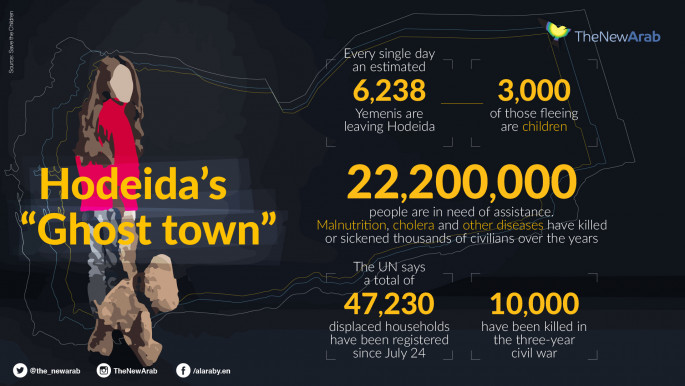Saudi-led offensive 'causing mass civilian casualties' in Yemen's Hodeida
The devastating offensive on Yemen's Hodeida has seen a "dramatic increase" in the number of civilians killed and maimed.
Save the Children said that from June to August, since the Saudi Arabia-led coalition began its attack on the rebel-held Red Sea port, at least 349 people have been killed.
The charity, using figures from monitoring group Armed Location and Event Data (ACLED), compared the numbers to the first five months of the year, January-May, when there was an average of 44 civilian casualties every month.
The number jumped to a monthly average of 116, an increase of 164 percent after the Saudi-led assault began
Speaking from Yemen's capital Sanaa, Tamer Kirolos, Yemen Country Director for Save the Children, said youngsters are the most vulnerable when explosive missiles and mortars hit crowded markets, schools and hospitals.
"Their smaller bodies mean they're more likely to have injuries to the head and neck, shrapnel is more likely to hit their vital organs and they have less blood to lose than adults. It's difficult for the world to hear but it's the stark reality for a child living in Yemen right now," he said.
The country's health system has all but collapsed as a result of the protracted and devastating war, meaning treatment for serious injuries is scarce. Prosthetics are hard to come by and there are few surgeons trained to treat traumatic wounds.
"Thousands of children have lost their arms or legs or the ability to speak or walk as a result of explosive weapons," Kirolos said.
"Health facilities in Yemen just aren't equipped to treat these kinds of injuries. These traumatic incidents can affect a child for the rest of their life. The warring parties must come to the negotiating table to help end the suffering of Yemeni children. They can start by ending the use of explosive weapons in populated areas so children aren't at risk of death or injury as they go about their daily lives."
Hodeida and its vital port are currently controlled by the Houthis but the Saudi- and Emirati-led coalition has been trying to wrestle back control over this strategic city, the entry point of most of the impoverished country's imports and aid, leading to a significant increase in attacks on civilians.
 |
The world seems to be accepting an outrageous disregard for the conventions of war, and children are paying the price." |  |
Since June, pro-government troops, backed by coalition air strikes, have retaken a number of towns across Hodeida province but have not yet breached the city.
The coalition in July announced a temporary ceasefire to give UN-brokered peace talks a chance, but renewed the assault earlier this month.
Save the Children has made a fresh appeal for the international community to take action in Yemen as world leaders gather in New York for the UN General Assembly.
Helle Thorning-Schmidt, CEO of Save the Children International, said: "This is a War on Children. The world seems to be accepting an outrageous disregard for the conventions of war, and children are paying the price."
There has been more than a three-fold (342 per cent) increase in verified civilian casualties in Hodeida over the past two years, with 129 recorded in 2016 to 571 in just the first eight months of this year (January-August).
The actual civilian death toll is likely to be higher as many deaths go unreported, Save the Children said. In July and August alone at least 100 children were killed across Yemen.
The humanitarian crisis in Yemen is widely acknowledged as the worst in the world. 
![Yemen [Save the Children] Yemen [Save the Children]](/sites/default/files/styles/image_345x195/public/media/images/8344CD5E-98CA-4920-B132-B63A49FDADC0.png?h=d1cb525d&itok=wi72EGK6)




 Follow the Middle East's top stories in English at The New Arab on Google News
Follow the Middle East's top stories in English at The New Arab on Google News
![Israeli forces ordered bombed Gaza's Jabalia, ordering residents to leave [Getty]](/sites/default/files/styles/image_330x185/public/2176418030.jpeg?h=a5f2f23a&itok=_YGZaP1z)

